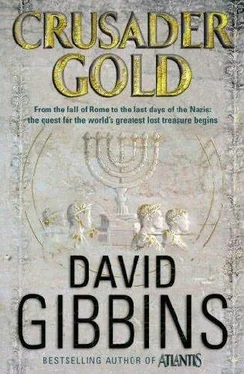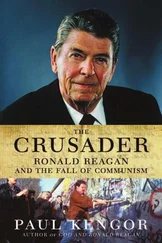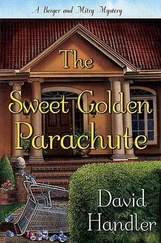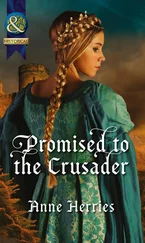David Gibbins - The Crusader's gold
Здесь есть возможность читать онлайн «David Gibbins - The Crusader's gold» весь текст электронной книги совершенно бесплатно (целиком полную версию без сокращений). В некоторых случаях можно слушать аудио, скачать через торрент в формате fb2 и присутствует краткое содержание. Жанр: Прочие приключения, на английском языке. Описание произведения, (предисловие) а так же отзывы посетителей доступны на портале библиотеки ЛибКат.
- Название:The Crusader's gold
- Автор:
- Жанр:
- Год:неизвестен
- ISBN:нет данных
- Рейтинг книги:3 / 5. Голосов: 1
-
Избранное:Добавить в избранное
- Отзывы:
-
Ваша оценка:
- 60
- 1
- 2
- 3
- 4
- 5
The Crusader's gold: краткое содержание, описание и аннотация
Предлагаем к чтению аннотацию, описание, краткое содержание или предисловие (зависит от того, что написал сам автор книги «The Crusader's gold»). Если вы не нашли необходимую информацию о книге — напишите в комментариях, мы постараемся отыскать её.
The Crusader's gold — читать онлайн бесплатно полную книгу (весь текст) целиком
Ниже представлен текст книги, разбитый по страницам. Система сохранения места последней прочитанной страницы, позволяет с удобством читать онлайн бесплатно книгу «The Crusader's gold», без необходимости каждый раз заново искать на чём Вы остановились. Поставьте закладку, и сможете в любой момент перейти на страницу, на которой закончили чтение.
Интервал:
Закладка:
“All those who possess this work, or who hear, read or see it, pray to Jesus in his godhead to have pity on Richard of Holdingham or of Sleaford, who made it and set it out, that he may be granted bliss in heaven.”
It seemed appropriate that Richard’s last words should also be theirs, that they should finish their task at the spot where the scribe had last lifted his quill from the parchment almost seven hundred years before.
Twenty minutes later Maria stood in the centre of the room and gazed one last time at the map before it was sealed behind its protective glass covering. With the spotlight now removed, the low-intensity glow of the room seemed to accentuate the age-old appearance of the vellum, the shadows and undulations showing where the calfskin had shrunk and buckled with the passing of the years.
Normally the job of cleaning manuscripts would be left to her technical staff at the institute in Oxford. But when the call came for a new programme of restoration on the Mappa Mundi in Hereford Cathedral, the temptation proved too great. It was the chance of a lifetime, the opportunity to work on the greatest extant thirteenth-century illuminated manuscript, to touch with her own hands the most important and celebrated medieval map in the world.
As her eyes adjusted to the gloom, the familiar form began to take shape. Almost filling the immense squared parchment was an orb more than four feet wide. At the centre was Jerusalem, and below it the T-shape of the Mediterranean dividing Asia, Africa and Europe. Squeezed in at the lower left were the British Isles, and in the exergue beyond was the inscription she had been cleaning. Everywhere on the map were hundreds of miniature drawings with captions in Latin and French, some illustrating biblical stories and others depicting bizarre creatures and mythical places.
It was a cornucopia of fact and fantasy, the supreme expression of the medieval mind. Yet it was also hemmed in by ignorance. In its order and confidence the map seemed the last statement on the world of men, yet beyond the thin strip of ocean that encircled Christendom lay nothing at all. To Maria the figure of Christ in the gable above seemed to be sitting in judgement not only on the dead but also on the living, on men with the hubris to think that the myriad wonders they had crammed into their map of the world represented anything like the entirety of God’s creation.
“Dr. de Montijo. You must come at once.”
The dapper figure in the clerical robe caught up to Maria as she made her way briskly across the cathedral forecourt, her umbrella raised against the perennial English drizzle. She was due back in Oxford that evening and had little time to spare if she was going to catch the train.
“This had better be good,” she said, her slight Spanish accent giving a lilt to her voice. “I’m scheduled to give a seminar on Richard of Holdingham at my institute in about three hours and need time to prepare.”
“That may just have to wait,” the little man wheezed excitedly. “The workmen in the old Chained Library have just made an extraordinary discovery. Your assistant is already with them.”
Together Maria and the cleric approached the north porch of the cathedral. With its soft honey hue the weathered sandstone of the buttresses made Hereford seem less forbidding than many of the great cathedrals of England, yet even so the effect when they entered was awesome. Maria glanced down the nave to the altar and up at the cavernous space in between, her view framed by the massive pillars on either side that rose to the smaller arches of the clerestory and the spreading fans of the ceiling vault far above. As she followed the cleric up the north aisle she was assailed by the smell of damp stone and a faint hint of decay, as if the sickly reek of putrefaction which had permeated the cathedral for so long had left a lingering aura long after the last burial vaults had been sealed.
The nave had changed little since Richard of Holdingham last passed this way. She brushed against a pillar and felt a sudden thrill of intimacy, as if she had reached back in time to shadow the great man’s footsteps. In his day the ponderous masonry of the Normans had been in place for only a century, yet a minster had stood on this spot since the time of the Anglo-Saxon kingdom of Mercia. It had been the Cathedral Church of St. Ethelbert, the king of East Anglia who had been foully murdered nearby. In Richard’s day it also attracted pilgrims who came from far and wide to pay homage to Thomas Becket, the archbishop martyred at Canterbury, whose enamel reliquary had also survived through the centuries, another of the cathedral’s great treasures alongside the Mappa Mundi.
After passing the north transept they reached the choir aisle where the map had been displayed over the past century before being moved to its present home in a purpose-built museum outside. Immediately opposite the blank space on the wall was a low doorway into the outer structure of the cathedral. Through it the beginning of a spiral staircase could be seen.
“The reconstruction work is almost complete,” the cleric said. “This is just a precaution.” He passed Maria a yellow safety helmet and put one on himself, its appearance incongruous above his brown clerical cassock. As she followed him up the steeply corkscrewing steps, his words resounded with a muffled echo.
“A sandstone cathedral is like a wooden ship,” he explained. “Keep an old hull in service long enough and all the timbers will need to be renewed. Like HMS Victory. Sandstone isn’t the most durable building material. When we moved the library we took the opportunity for some much-needed stone replacement.”
They were nearing the chamber which had once held Hereford’s world-renowned chained library, a fabulous collection including rare incunabula, books printed before 1500, as well as 227 manuscript volumes, beginning with the priceless Hereford Gospels of the eighth century. Both the books and the cases to which they had been chained were now reconstituted in the museum which housed the Mappa Mundi, itself once also stored in the library.
After ascending to the clerestory level, they squeezed past a stack of freshly quarried blocks and stood at the entrance to the chamber. In the thin rays of daylight cast through the slit windows they could just make out the paler patches along the walls where the bookcases had once been. Instead of a library, the chamber now looked like a medieval stonemason’s workshop, with cutting tools and fragments of decayed masonry piled all over the floor.
At the far end a group of workmen were huddled over a patch of bright light in the wall. It came from a hole where two blocks of masonry had been removed, leaving a space just wide enough for a slender form to get through. At that moment a head appeared upside-down, its tousled blond hair and glasses caked in dust.
“Maria! You’re not going to believe this.”
Jeremy Haverstock had been her best-ever doctoral student, a virtuoso in early Germanic languages, but he had been cloistered in Oxford writing his dissertation and was clearly revelling in the sense of adventure. She had invited him along to Hereford to give him a break, and to share in the unique experience. Since his arrival from America she had encouraged him to travel widely to visit early monastic libraries, yet he still had the infectious enthusiasm of a tourist touching history for the first time. She smiled in spite of herself as she and the cleric picked their way across the debris and pulled down the dust masks from their helmets.
“It’s your career on the line,” she said. “Anything less than an Augustinian Bible and you’ll be doing the seminar single-handed.”
“It’s better than that. Far better.” As they approached she could see his face was streaked with sweat despite the chill of the room. He heaved one of the blocks aside and withdrew out of sight into the wall. “Follow me.”
Читать дальшеИнтервал:
Закладка:
Похожие книги на «The Crusader's gold»
Представляем Вашему вниманию похожие книги на «The Crusader's gold» списком для выбора. Мы отобрали схожую по названию и смыслу литературу в надежде предоставить читателям больше вариантов отыскать новые, интересные, ещё непрочитанные произведения.
Обсуждение, отзывы о книге «The Crusader's gold» и просто собственные мнения читателей. Оставьте ваши комментарии, напишите, что Вы думаете о произведении, его смысле или главных героях. Укажите что конкретно понравилось, а что нет, и почему Вы так считаете.












